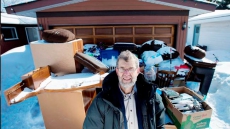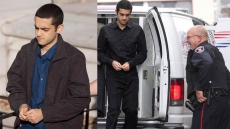VANCOUVER — In a community laboratory she co-founded, Alaina Hardie isolates and sequences sections of her own DNA though she has no formal education in biology.
The Toronto software developer believes that "citizen scientists" like her have potential to make breakthroughs as significant as universities or big corporations. It appears the federal government thinks so too.
"I sure hope they capitalize on us," Hardie said ahead of a do-it-yourself biology convention in Ottawa scheduled for Wednesday. "In some garage, or DIY hackerspace, or after-hours in some university lab, the next big thing is coming."
The Public Health Agency of Canada has invited 60 DIY-biology leaders, academics and police to attend the first-ever "Do-It-Yourself Biology Summit." It will also host 300 videolinks at a total conference cost of $15,000, said Marianne Heisz, a director with the agency's centre for biosecurity.
Participants will get a snapshot of the growing open-science movement, discuss building a culture of safety and dream up future collaborations. Heisz said the government wants to leverage the brainpower of a legitimate emerging community.
"They're doing real science," she said. "They're just doing it in a non-traditional way, sometimes outside of the larger institutions that it traditionally has been done."
Practitioners say DIY biology amounts to crowdsourcing science. They believe making biological sciences accessible to anyone could spur solutions and new inventions, similar to the leap forward when computers were put in the hands of the masses.
Biotechnology has produced advancements from medicine to new types of food to materials used in cars, houses and cellphones, said Connor Dickie, who planted the summit idea with government two years ago.
"You hear stories about Frederick Banting inventing insulin, which is an absolutely amazing and critical contribution to the world," said Dickie of the Canadian Nobel laureate.
"We can have more of that faster, better and cheaper because of the new kinds of technologies that are coming out of the DIY biology community."
Dickie was inspired after attending a conference of amateur biologists in San Francisco sponsored by the Federal Bureau of Investigation. He proposed CSIS and the RCMP be invited to the Canadian government's event.
"To let everyone know the state of our work and also make sure this technology remains safe and is used for good things," he said.
Heisz said new legislation came into force in December regulating work with pathogenic materials. The summit will inform those in the DIY community who lack microbiology backgrounds and may be unaware of potential hazards, she said.
"There really shouldn't be any nervousness," she said.
DIY community labs have sprung up from the West Coast to Toronto and Montreal, with each boasting hundreds of members.
Derek Jacoby, who launched Canada's first lab in Victoria in 2012, has taught children as young as five to make bacteria glow with extracted jellyfish genes. At the FBI conference he performed a demonstration involving Epsom salts and laxatives.
"To watch the agents' faces as they realized, 'Oh, genetic transformation is happening with unregulated things from the drugstore?' That was a most amusing picture," he said.
Canada's economy stands to gain from potential advancements, say the citizen scientists, while competitiveness could stall if government doesn't embrace potential opportunities.
Scott Pownall, who runs the Open Science Network in Vancouver, says he believes a number of PhDs are leaving the sciences and calls himself an example of what's happening.
Pownall has a doctorate in genetics from the University of British Columbia but collapsed a biotech firm in 2009 to become a freelance software developer.
"Community biolabs may be an avenue in which individuals outside of academia and industry can economically drive innovation."




